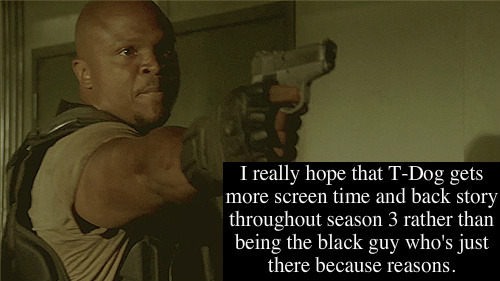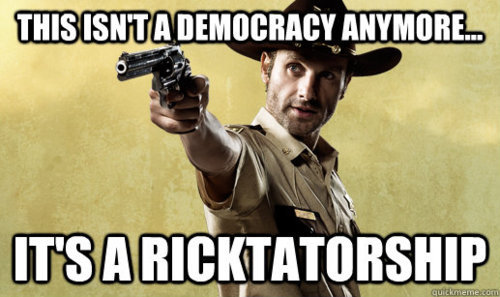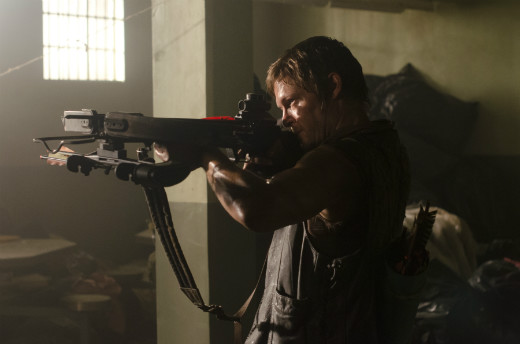Every night I lock up my house. This isn’t particularly interesting. Despite certain fictional assurances that the Midwest is a place where you can leave your doors unlocked at night, I know for a fact that if your diligence wanes, someone might just walk into your house. In my case, it was many moons ago when my husband and I inadvertently left the door to our apartment unlocked ere we went to bed. We’d gotten sloppy; we lived in a relatively small apartment building with what looked like a good security system, and I’ve never been good at paranoia. So I woke up that night in a near panic because I knew I had not dreamed the sound of someone in our living room. I called the cops, and considered the angles out of the sliding window unit while my husband ventured into the dark unknown of our living room.
The cops frisked my husband as he shot out of the apartment, spelling his name and telling them his wife was still inside. I was back against the door, low to the ground, like someone might shoot through the shitboard that made up the material of the doors. I know I watch too much tv. They coaxed me out eventually; I can admit I’m a coward. We stood with some cops in our incredibly messy living room for a while – we were in the process of boxing our possessions so we could move into our house – and the cops kept shining their flashlights onto disheveled piles of our stuff and asking if the mess was normal. It was embarrassing. At some point we all realized there was someone else in the room, someone asleep under the laundry I’d washed and folded and left on the back of the couch. The cops shone a flashlight on an exposed arm and asked us several times, “Is this yours?” I still remember the odd phrasing.
I ended up back in the bathroom, I think all the way into the shower, while the cops woke and then sat on and cuffed an extravagantly drunk young man. He was naked but for a pair of socks and a baseball cap. After the cops fetched a truly scratchy looking baby blue cop blanket and swaddled him in it, they coaxed me back out of the bathroom to see if I knew him. I didn’t. He was just some kid who had three too many Long Island Teas at Liquor Lyle’s, pissed himself, doffed his clothes, and then went looking for the first open door. Ours was the first open door. We were diligent for a long while, but I know since then I’ve gotten lax again a few several times. We have a biggish dog, and I figure if someone really wants in, they’ll probably get in.
I’m really glad we don’t have walking cannibal corpses in the neighborhood though, boy howdy, because I figure most burglars are going to go for the tv and not try to eat my face off. Which is what brings this long winded anecdote to the the mid season finale of Walking Dead, Made to Suffer. This season the writers have been working the whole security state post-9/11 panic angle really hard, made obnoxiously manifest in The Governor’s use of the term “terrorist” in his final speech. I had a strangely fruitful conversation with a stranger on the Internet last week, where we talked about subtext of this season, how it seems on the face of it the writers are bagging democracy, from the “this is not a democracy” speech, down to the dark Mayberry of Woodbury with its soft spoken despot with democratical-sounding titles. Our hero is a grief-broken lunatic whose leadership style seems more chain of command than consensus. When he’s around to lead, anyway, and not howling through the prison making unilateral decisions about who lives and dies – though poorly – and talking to ghosts on the phone.
What are we to make of this? Of course, the Governor is eeevil, or at the very least, batshit insane, what with his heads in a tank and zombie daughter in the closet. The part when Michonne came to exact her vengeance was a strange sequence, because I found myself totally crushed by The Gov’s reaction to her killing his child. Yes, yes, she’s a zombie and all that, but Morissey was so stricken, so visibly destroyed by the loss that I really questioned Michonne’s motivations there. That was a bitch move. Andrea’s convenient arrival really showed the lack of backstory between the two women – I don’t think the writers can even imagine what those two might have talked about, they being women and all – and what should have come off as a tense interpersonal moment ended up being scene mechanics.
But back to the security state thing. Woodbury’s leadership seems hell-bent on insulating their town from what has happened, what having happened being the zombie apocalypse. They’re locking their doors against the naked drunks, but they are wide open for the canny burglar who wants to eat their faces off. Every single time we took off our damn shoes while going through the airport security this Thanksgiving, my kids asked me, why are we doing this? And my answer was that one time, there was this damned idiot who thought he could blow up a plane with a shoe. (Jesus Christ, Austen Powers called.) My country is busy rending people and throwing them into the screaming pits – which, good call with the name there, gov; shoulda gone with something like “School of the Americas” – and what we’re getting for our trouble is a bunch of Michonnes. Not to draw too hard of an analogy or anything.
Anyway, teetering metaphors aside, Made to Suffer was very much in the mode of this season so far, which is go go go go. Tyreese was introduced – who was Rick’s lieutenant in the comics – necessitating the death of the other black male character, T-Dog…I mean, whatever his name was who replaced T-Dog. I swear to God, I joked to my husband that that would happen the second Tyreese was on screen, and good golly, am I tired of how lame the writers are. Romanov-mustache dude turns out to be a pedobear and short hair doesn’t mean you’re a lesbian. But man, am I Team Tyreese at the moment. He’s, like, the only person who has ever behaved in a rational manner – letting the bitten woman come along so her living partner can work through what happened, not throwing a fit and glowering when tiny badass, Carl, locks them up until they can be vetted.
Michonne had an actual moment of emotion there when Rick almost tosses her out of the group, I think the first time I’ve seen that woman do anything but scowl. Glenn and Maggie, I heart the hell out of those two and their towering badassery. and I also appreciate that Glenn drops the knowledge immediately that Merle is with the Gov, given how much hiding the football they’ve been doing with him. Internet speculation has it that Merle is being planted as a mole in the Rickocrats when Merle and Daryl eventually escape from their predicament, but I’m not discounting how pissed the Gov is about Merle lying about Michonne being dead.
Well, anyway, I think a lot of this episode was rushed, and I’m somewhat unimpressed with the big battle stuff in Woodbury – why is that people can head-shoot zombies right and left, and can’t hit the side of a barn when living folk turn up – and I sprained my eyeballs eye-rolling at all the terrorist talk in the final Governor speech. Speaking of the side of the metaphorical barn, good god. Individual performances continue to impress, like Morrissey and Maggie and Glenn, even though sometimes I think the caliber of the performance might even undercut whatever bullshit point the writers were going for. Often my favorite moment in series are the ones where nothing happens and people just talk about stuff, which has been thin on the ground this season. We need more people being people before we can cower about how they have become monsters.
was bound and determined to disappoint a mite, I freaked out anyway and ordered a copy from England. America, why you no publish Exit Kingdom
? I fairly loved Reapers, with its blurry genre lines and metaphysical America, a long toothpick poling the detritus in our bloody civic teeth. I can see why some readers wouldn’t cotton to it: the heavy allusiveness and almost overt symbolism, the dialect, the stripped punctuation, the zombies. But I loved Temple. I loved her fierce orphan pragmatism, a child of the apocalypse more easy with wastelands and the dead than nail-bitten civilization and the living. She was all squinting prairie hardness and kudzu tenacity.
is less sequel and more companion novel, a recounting by Moses Todd five years after the events in Reapers of five years before the same. Moses Todd may have been an anchor to the events of Reapers, but he was not the center, and his centrality here is uneasy and reactive. There’s another girl, the Vestal Amata, whose central mystery did not resonate with me, whose femininity and changeability seemed the kind of thing a man would understand about a woman’s nature, but no woman would ever feel inside herself, about herself. That’s fine, on some level: this is a man’s story of a woman, and not her own. People are told in many ways.
, you will likely enjoy this, but in a worn way, in a way that tries to recapture a dream slipped out like a fish. Now that I write that, I remember with a painful clarity the nightmares I had from this book last night – a nightmare far out of scale from the near placid and resigned tone of this book. There were children – a school room – and so much blood from biting as the infection spread from child to child. Today’s events in Connecticut – I cannot stop crying. I dream nightmares that come true. Oh, America, I fear and grieve for you so much. Moses Todd does too, and that part we can agree on.



